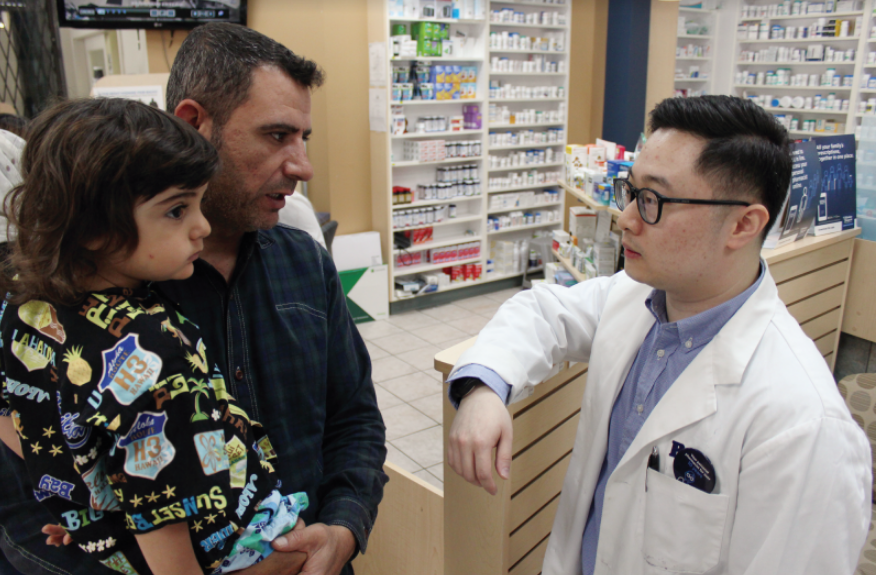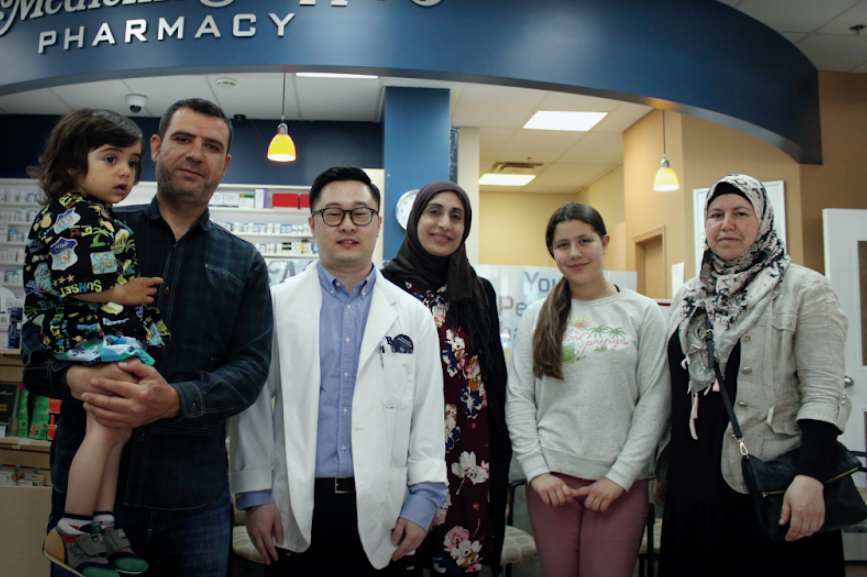
Patient Thaaer Alibrahim (left) speaks with pharmacy manager Kalvin Liu (right) for advice to deal with his son’s seasonal allergies.
Situated in the bustling neighbourhood near Metrotown in central Burnaby, The Medicine Shoppe at 4277 Kingsway is home to a diverse clientele of patients, including an increasing number of patients who arrived in Canada as refugees. The area is a popular place to settle for those new to B.C.
“Many of our patients are coming from places with completely different medical systems and they, of course, speak various languages,” says Kalvin Liu, pharmacy manager since 2017. “Adjusting to the fact that they not only communicate differently but also have different cultural expectations is key to successfully providing care to our patient population.”
A 2015 graduate of the University of British Columbia’s pharmacy program, Liu has pursued opportunities to work in various community settings with marginalized populations and patients from different ethnic backgrounds, including a year in the Downtown Eastside.
At The Medicine Shoppe, the number of patients with refugee status has increased over the past two years in part due to the influx of refugees from Syria and support from surrounding medical clinics. This has kept Liu busy, working hard to find solutions for this vulnerable population.
What first led you into pharmacy?
I have always had a passion for helping those less fortunate than myself, and pharmacy gave me the perfect platform by which I could do it. I wanted to be able to work with patients and allow them to understand that in pharmacy, we are not doing things to them; we are doing things with them.
What are your priorities as a pharmacy manager?
As a pharmacist, I do all the things the title implies. In addition to these tasks, I am in charge of evaluating the suitability of the medications for my patients, and whether or not there are better options for them. I also focus on deprescribing when I can to reduce the pill burden and the costs my patients have to pay. I am constantly assessing each patient that comes into my pharmacy for any potential underlying conditions to see if there are any unmet medical needs.
Checking their current medications is key to removing duplicate therapies they may have been prescribed in other provinces or countries prior to their journey to Vancouver. My job would involve trying to convert medication regimens my patients have been taking overseas into an equally efficacious medication regimen that we can readily supply them with here.
Optimizing drug therapies, especially for chronic conditions, is another large part of my day-to-day job. I see a large number of patients requiring help with their diabetes or psychiatric conditions such as depression, post-traumatic stress disorder or anxiety.
How does your pharmacy demonstrate collaborative care?
Our pharmacy tries to emulate the concept of team-based care by working in conjunction with other health professionals near our pharmacy. Our goal is to provide our medical expertise to one of the populations that could use it the most: refugee patients.
Often doctors would walk over or phone us to chat about our mutual patients and we would formulate a care plan for the conditions being worked on. I believe collaborative prescribing is one area where pharmacists can demonstrate our expanded scope of practice, but we just need a proper framework in place.

How is patient care different for refugee patients?
Our patients speak various languages and come from many cultural backgrounds. Respect for their diverse beliefs and how they want to be treated is key to providing care for them. This also extends to their religious beliefs and any limitations on things such as formulations that the patients are able to use.
For example, some patients are fleeing war zones or have gone through discrimination or abuse against their transgender identity. We try to create a relaxed, caring and non-judgmental environment for them to ensure their emotional wellbeing.
Communicating with them can be difficult, but we do our best to ensure that they understand the benefits and risks of their medications. I’d say about one in three new refugee patients come into our pharmacy not entirely understanding what their current medications are for and how they are supposed to be taking it.
This means we do a large number of follow-ups on our patients to see how they’re doing and to continue to educate them on their medications. Due to their language barrier, refugees are often lost in navigating our health-care system and may slip through the cracks. We help them by proactively bridging the gap between their other health-care providers to bring the patient to the centre of the circle of care. Cost is often another huge concern for our patients, and we do our best to get as many of their medications covered as reasonably possible.
What have you learned from working with refugee patients that you have applied to your general practice?
I have learned to keep an open mind when it comes to patient care, and to appreciate the patient’s situation relative to their health conditions and medications. I estimate that more than two-thirds of refugee patients face challenges with medication compliance, especially when you factor in cultural considerations such as Ramadan.
For example, when interviewing a patient presenting with a prescription for strep throat, we discovered that he was experiencing hypoglycemia despite elevated fasting blood glucose and A1C due to taking multiple doses of antihyperglycemic medications together after iftar (the meal served after sunset during Ramadan). We contacted the prescriber and eventually changed their antibiotics and antihyperglycemics to once daily extended-release regimens.
